Jonathan Slinger:If it were done when ÔÇÖtis done, then ÔÇÖtwere well it were done quickly.
Michael Boyd:Macbeth starts off as the brightest, and best, and the nearest, and the dearest to Duncan. And then he falls.
Michael Boyd:This first soliloquy, it reminds me of "to be or not to be", in a way. It's another of those brilliant Shakespeare, "should I, shouldn't I?"
Jonathan Slinger:If it were done when ÔÇÖtis done, then ÔÇÖtwere well it were done quickly.
Jonathan Slinger:If the
Jonathan Slinger:assassination
Jonathan Slinger:could trammel up the consequenceÔÇô
Michael Boyd:I was just about to ask you, just in that go, there was a little moment before assassination.
Jonathan Slinger:It's because it's an odd word to choose but he chooses it very carefully.
Jonathan Slinger:You know, this isn't murder.
Michael Boyd:Yeah, it's like a euphemismÔÇô
Jonathan Slinger:It's not murder.
Michael Boyd:It's a nicer word than murder.
Jonathan Slinger:It's an assassination, everybody. That's all it is. My grandfather did it. It's a political move.
Jonathan Slinger:Macbeth's grandfather actually went and did it, killed the king, stole-- Got the crown and then ruled for a long time and was very successful.
Jonathan Slinger:Macbeth's father on the other hand, was a bit less successful. I started getting this picture of Macbeth wanting to be more like his grandfather, and there's something about the drive of Macbeth is about reclaiming the family name as being revered and adored.
Jonathan Slinger:If the assassination
Jonathan Slinger:Could trammel up the consequence and catch, with his surcease success.
Michael Boyd:Is this door open? I'm just thinking, place the banquet very firmly in here, come out, shut the door. You had to get out of that room
Michael Boyd:And just, you were going mental. You had to escape and just, you had to get your thoughts together and so, it's probably much, much, much, much faster. It's probably
Jonathan Slinger:If it were done when ÔÇÖtis done, then ÔÇÖtwere well it were done quickly. If the assassination could trammel up the consequence and catch with his surcease success.
Jonathan Slinger:It gave him much more conflict and much more, kind of, vulnerability, actually and there was much more crisis somehow in him.
Jonathan Slinger:That but this blow might be the be-all and the end-all here, but here, upon this bank and shoal of time we'd jump the life to come.
Jonathan Slinger:"We'd jump the life to come" means if I knew that everything would be alright here on Earth after I killed him, I would risk what happens to me after.
Jonathan Slinger:He knows if he does go ahead and do it, and kills Duncan, that the outcome will be eternal damnation, purgatory, horrible hell.
Jonathan Slinger:What he's saying here is, if I could just reign as king brilliantly for the rest of my life as a result of this blow, then I'll risk what happens to me after, I think.
Michael Boyd:But the problem with your reading is, if there were no consequences of the murder, then you wouldn't be risking anything. We'd risk the life to come, you wouldn't be risking.
Jonathan Slinger:No, he's talking about what's gonna happen here because the next line is, "But in these cases, we still have judgement here."
Jonathan Slinger:Somebody is going to kill me for what I've done, that's what he's saying. If it was only about risking the lot of what was going to happen after life, then he'd do it.
Michael Boyd:You reckon?
Jonathan Slinger:If he knew-- Yeah.
Jonathan Slinger:He's here in double trust. First as I'm his kinsman and his subject, strong both against the deed, then as I am his host, who should, against his murderer, shut the door. Not
Jonathan Slinger:bear the knife myself.
Michael Boyd:Just heard the wor-- It's interesting to note how the word murdered does creep back in. Should shut the door, who should against the murderer, shut the door. Not bear the knife myself. i.e. Be the murderer.
Michael Boyd:It is deeply wicked to murder a king. You're going to be damned.
Michael Boyd:It is even more wicked to murder a good king, whom everyone knows is good.
Michael Boyd:And it is even more wicked to murder that good king when he is sleeping.
Jonathan Slinger:I have no spur to prick the sides of my intent. But only vaulting ambition.
Michael Boyd:Why is ambition vaulting ambition? Why is that the term of abuse on yourself at the end?
Jonathan Slinger:Because we're talking about murder.
Michael Boyd:Yeah but he's using the word ambition though.
Jonathan Slinger:Yeah I know.
Michael Boyd:What's wrong with ambition?
Michael Boyd:It's good to be ambitious. In fact nowadays, everybody's told if you're not ambitious then somehow you're underachieving.
Jonathan Slinger:Yeah, but it's good to be ambitious, what he's saying is that his ambition, in this case, is the only thing that's driving him to kill one of his best friends.
Michael Boyd:Yes, but what's wrong with the ambition?
Jonathan Slinger:Well that's what he's saying, that's the only thing I have and it's not good enough. I have no spur.
Jonathan Slinger:It's notÔÇô
Michael Boyd:But you could be ambitious to succeed Duncan? To be the next in line.
Jonathan Slinger:Yes, he is ambitious to succeed Duncan, that's the thing. What he's saying in that moment is, is that that surely isn't enough in the eyes of God.
Michael Boyd:Macbeth achieves complete clarity, that he must not do this thing of seizing the crown, usurping the crown, murdering a sacred king.
Jonathan Slinger:I have no spur, to prick the sides of my intent. But only vaulting ambition. Which o'erleaps itself and falls on the other.
Video summary
Michael Boyd and Jonathan Slinger rehearse MacbethÔÇÖs soliloquy.
They consider the distinction between assassination and murder and unpick key images in the speech.
This short film is from the ┤¾¤¾┤½├¢ series, Shakespeare Unlocked.
Teacher Notes
This short film could be used to introduce the dramatic method of the soliloquy.
Influenced by a text or play they are studying, as your students to write a soliloquy for a character of their choice.
A soliloquy often reveals the character's thoughts to the audience as an aside, without revealing them to the other characters.
What is really going through their character's mind?
Your students could then perform their soliloquies, and class discussions can follow on how the students have different interpretations of the characters' inner lives.
This short film is suitable for teaching GCSE English literature and drama in England, Wales and Northern Ireland and National 4/ 5 in Scotland.
Act 2, Scene 2 - Bloody Daggers. video
Macbeth has committed the murder and is overcome with guilt and fear.
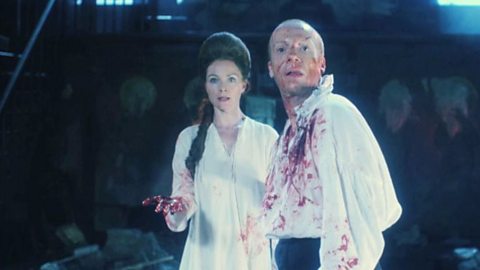
Act 2, Scene 2 - Hearing noises (workshop) video
The cast explore how Lady Macbeth takes control as Macbeth struggles with his guilty conscience.
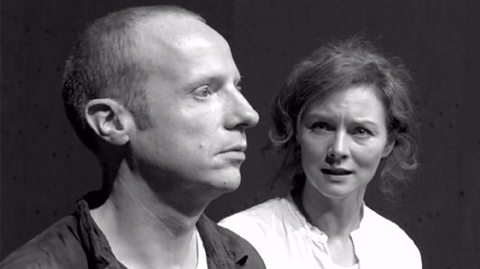
Act 2, Scene 2 - Rhythm of the language (workshop) video
The cast discuss iambic pentameter and explore the rhythm of ShakespeareÔÇÖs language.
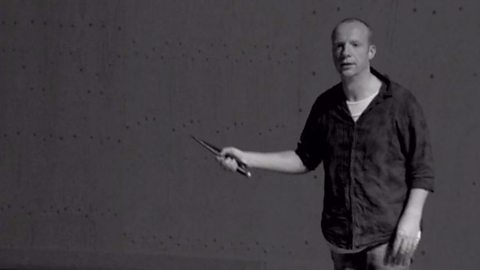
Act 2, Scene 2 - The king is dead (workshop) video
The actors and director explore the Macbeths' very different responses to DuncanÔÇÖs murder.
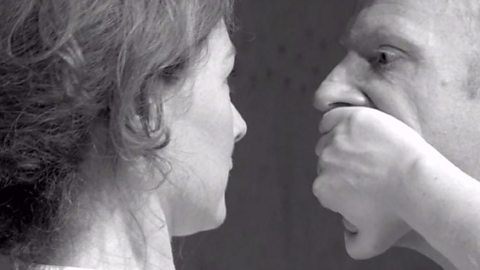
Act 5, Scene 1 - Candle in the dark (workshop) video
The director and actors experiment with the staging of the sleepwalking scene.
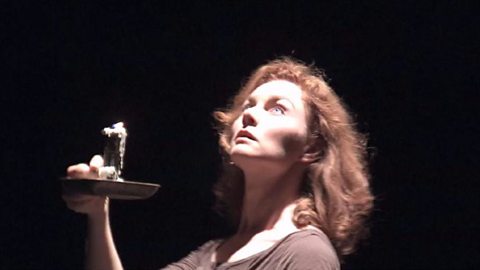
Act 5, Scene 1 - Sleepwalking. video
The doctor and lady-in-waiting witness Lady Macbeth sleepwalking.
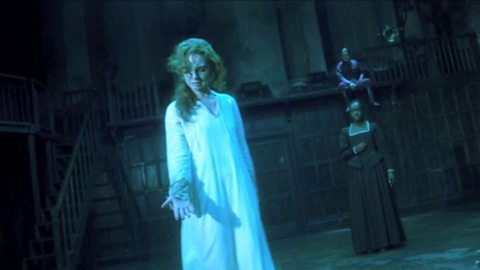
Act 5, Scene 1 - Sleepwalking Queen (workshop) video
The director investigates how knowledge of Lady MacbethÔÇÖs secret changes the lives of others.
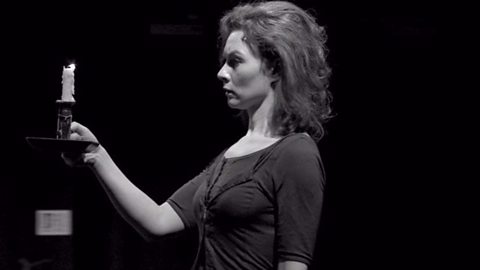
Act 5, Scene 1 - Unlocking the words (workshop) video
RSC Head of Voice, Lyn Darnley, helps Aislín McGuckin through a series of voice exercises.
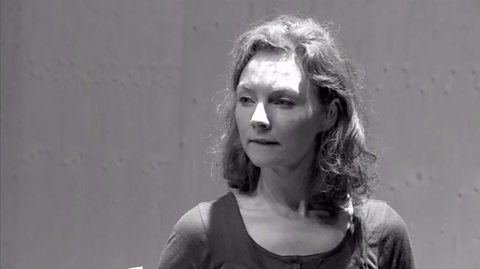
About the 2011 RSC production. video
A look at the production and how the design is informed by the period in which Macbeth was written.
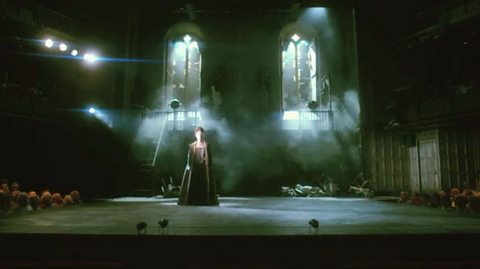
Act 1, Scene 7 - Persuading Macbeth (workshop) video
A look at the different ways of performing the scene when Lady Macbeth persuades her husband to kill the king.
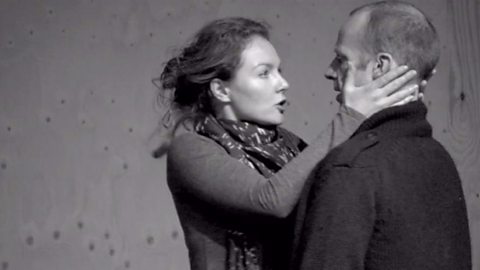
Act 1, Scene 7 - To Kill the King. video
Macbeth debates the murder of King Duncan and decides against it. Lady Macbeth uses a battery of strategies to change his mind.
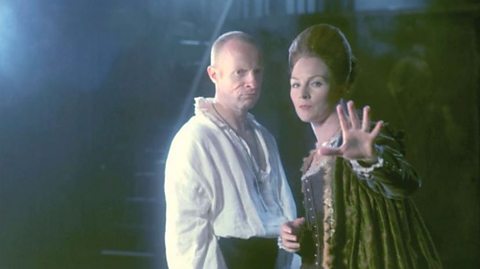
╠²